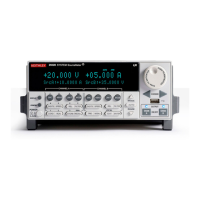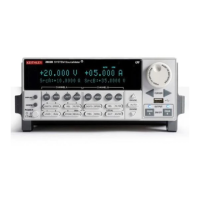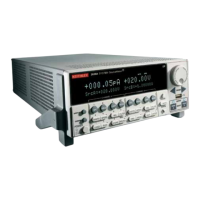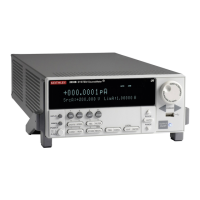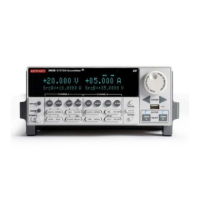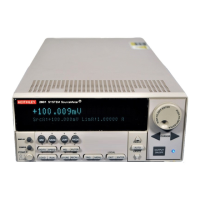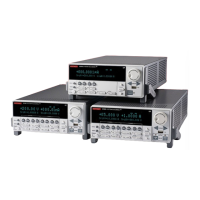2600S-901-01 Rev. C / January 2008 Return to Section Topics 2-35
Series 2600 System SourceMeter® Instruments Reference Manual Section 2: TSP Programming
NOTE When creating a script using the Test Script Builder, only the chunk is
typed in as shown above. See “
Using Test Script Builder” earlier in
this section for details on creating, loading and running the script.
When creating a script using a programming language, shell
commands must be included to manage interactions between the
host computer and TSP. The
loadscript command loads the script
into the Series 2600 and endscript signifies the end of the script.
Script using a function
TSL facilitates grouping commands and statements using the function keyword. Therefore, a
script can also consist of one or more functions. Once a script has been RUN, the host computer
can then call a function in the script directly.
The script in Table 2-2 contains an ICL command to set measurement speed (NPLC) and a
function (named sourcev). When this script is run, the measurement speed will set to 0.5 PLC and
make the
sourcev function available for calling.
Table 2-2
Example script using a function
Test Script Builder User’s Program Script
loadscript
smua.measure.nplc = 0.5 smua.measure.nplc = 0.5
function sourcev(v) function sourcev(v)
smua.source.levelv = v smua.source.levelv = v
i = smua.measure.i() i = smua.measure.i()
print(i) print(i)
return(i) return(i)
end end
endscript
When calling the function, you must specify the source voltage in the argument for the function.
For example, to set the source to 2V, call the function as follows:
sourcev(2)
Assuming SMU A output is on, it will output 2V and measure the current. The current reading is
sent to the host PC and displayed.
Interactive script
An interactive script prompts the operator (via the SourceMeter display) to input test parameters (via
the SourceMeter front panel). The chunk fragment in
Table 2-3 uses display messages to prompt the
operator to select an SMU Channel (A or B), a source function (I or V), and to input the source level.
When an input prompt is displayed, the script will wait until the operator inputs the parameter and/or
presses the ENTER key.
The display.prompt command in the following script prompts the user to input a source level. If a
value is not entered, the default level (1mA or 1V) will be set when ENTER is pressed. The
operator will not be able to input values that are not within the minimum (0.5mA or 0.1V) and
maximum (3mA or 10V) limits.
